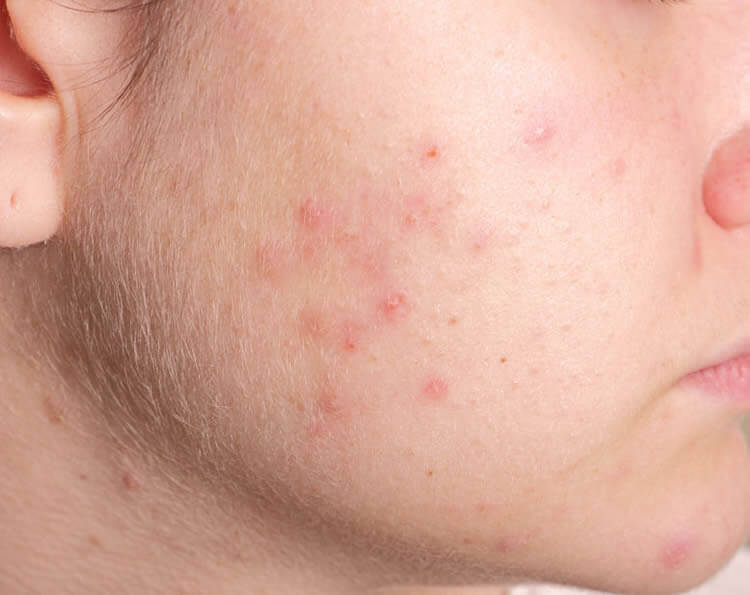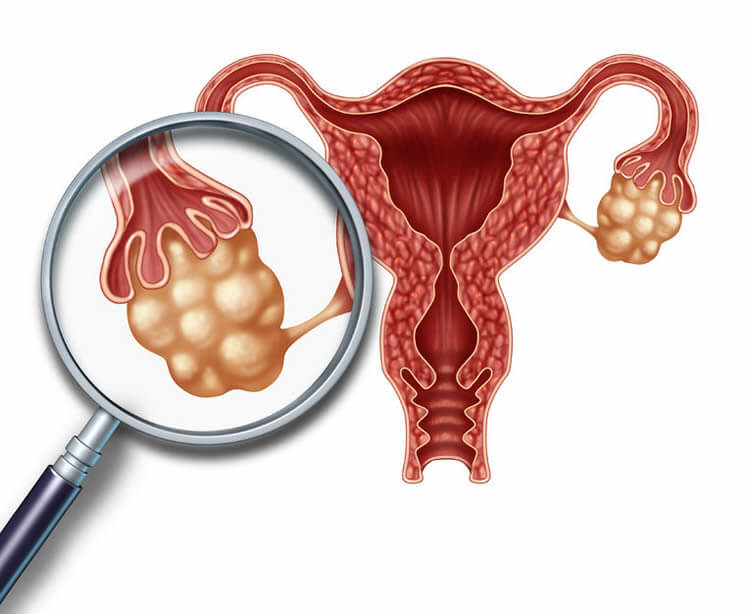PCOS is one of the most common hormonal disorders in women, affecting 1 in 10 women of childbearing age in the United States – that’s an estimated 5 million women! Few women are aware of what PCOS symptoms look like or how to manage these symptoms.
PCOS symptoms include infertility or difficulty conceiving, irregular periods, cystic acne, weight gain (although this is not the case for all PCOS patients), hirsutism (unwanted hair growth on the chin, chest, belly), thinning hair, mood changes, insulin resistance, and low sex drive. On an pelvic ultrasound, many women with PCOS will show multiple small “cysts” on the ovaries.
Lab work can show excess androgenic hormones like testosterone, DHEA and DHT (dihydrotestosterone) and andrstenedione. When women present to their PCPs or gynecologists with these signs and symptoms, often the treatment is hormonal contraceptive, aka “The Pill” along with a medication called spironolactone which blocks the excess androgenic hormones. Metformin, a drug used to regulate blood sugar, is also commonly prescribed in PCOS, especially for women who are trying to conceive.
While these drugs can suppress the acne, and unwanted hair growth, they can come with many side effects and ultimately they don’t get to the root of the problem. Eventually women will need to come off these medications for one of the following reasons: they want to conceive, the medication side effects are too much to deal with, or the medications stop working after several years. In each scenario we see most of the symptoms of PCOS come back with a vengeance.
The good news is that there are natural ways to treat PCOS…and it’s actually one of my favorite conditions to treat!
Addressing insulin resistance, inflammation, adrenal fatigue, thyroid disorders, and environmental toxins can go a long way toward balancing hormones naturally and overcoming PCOS. It’s crucial to address the underlying cause of your PCOS because it is associated with an increased risk of developing type 2 diabetes, high cholesterol, hypertension and heart disease. It’s also the most common cause of infertility, and this is what drives many women to seek help.
Diet and lifestyle factors can go a long way when treating PCOS and can even be curative in some cases. In cases where there is a strong genetic link, using acupuncture, herbs and supplements are usually necessary. It does take 6-12 months to see long term changes when living with PCOS, but the effort is well worth it.

Acne on the girl’s face. Image close-up
Case study (shared with permission):
When she sought treatment with me at 26 years old, Maria was sick of taking her birth control pills. She had read up on the risk of breast cancer associated with long term use of The Pill and realized she had been taking it for eight years already! Prior to starting birth control at 18 years old, Maria had started getting really bad cystic acne, mostly on her chin, mostly before her menstrual cycles. It was painful and embarrassing, and she felt like she had tried everything (her doctors had prescribed lots of antibiotics and topical Retin A).
She had also noticed some dark, thick hairs growing on her belly. Her cycles were irregular, often coming once every 2-3 months, with lots of pain. On two occasions, she had such severe pain with her periods she had to leave school. Her doctor recommended the pill and after a few months, Maria’s skin did clear up and she was satisfied with this solution. Fast forward 8 years, Maria had stopped the Pill and 3 months later her acne was worse than ever! She had cystic pimples that last for over a month, her cycles were completely unpredictable, she notices her hair thinning at the crown and the dark hairs are back on her belly.
Although she is on the thin side, she showed some evidence of blood sugar issues- getting “hangry” between meals, crashing after eating sugar or high carb meals, and showing low blood sugar when fasting. We identified through testing that Maria had adrenal fatigue, a slightly low thyroid, and anovulatory cycles- so basically her hormones were WAY out of balance. By creating a nutrition plan, giving her a low dose thyroid medication, and using herbs to balance her hormones- we were able to see a resolution of ALL of Maria’s PCOS symptoms. It took some time, but after 6 months, the acne was gone, and the cycles were becoming more regular each month.
After one year, Maria felt balanced enough to start weaning of the herbs and some of the other supplements and was able to keep her hormones balanced mainly through diet and lifestyle-although we did need to stick with they thyroid treatment. Prior to seeking help she feared she would never be able to conceive naturally with how unpredictable her cycles were…Maria is now the mother of a healthy baby boy, whom she conceived naturally. Maria is representative of so many women I have seen in my practice, and of so many women who are seeking answers to their hormone imbalances. She is proof that there is hope, that we can balance hormones naturally.
If you noted that you experience several of the symptoms of PCOS, now is the time to take action.
Don’t let PCOS be the reason you can’t conceive, or can’t lose the 20 lbs that’s accumulated over the years, or don’t feel comfortable in your own skin due to acne and hair changes. The great majority of my patients with PCOS have seen marked improvements in their cycle regularity, skin health, mood, energy, and weight when they follow a customized program.
CALL NOW TO SCHEDULE (520) 887-4287 OR REQUEST AN APPOINTMENT ONLINE
Dr. Katie Rose, ND
Naturopathic Doctor Tucson
(520) 887-4287
Follow me on Facebook

View comments
+ Leave a comment